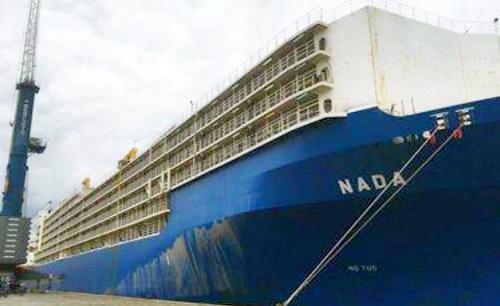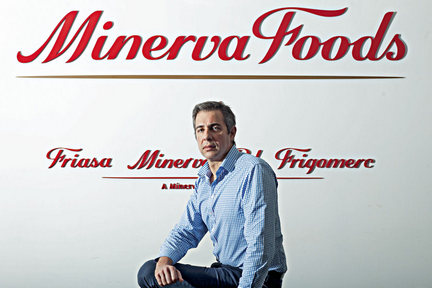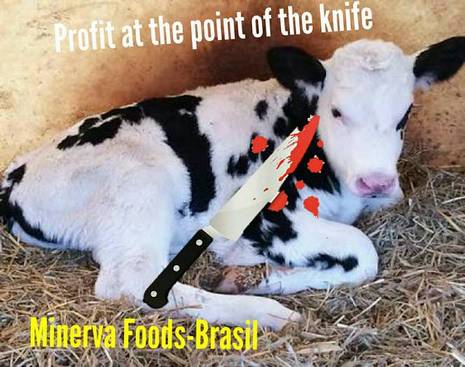Judiciary in turmoil as 100,000 Brazilian bull calves are prepared for shipment and slaughter/amp
HUMAN SYNTHESIS
email: humansynthesis0@gmail.com
#Judiciary in turmoil as 100,000 Brazilian bull calves are prepared for shipment and slaughter
Ana Luisa Naghettini | 15th February 2018
The Panamanian flagged vessel NADA is the world's largest livestock carrier, capable of carrying 30,000 bulls.

Renan Fiuza – G1(Globo)
A shipment of 27,000 live bull calves from Brazil to Turkey in squalid conditions on a single cargo ship took place in December. The Ecologist reported the story, which shocked our readers. Now 100,000 bulls are destined for the same fate. Activists in Brazil are desperate to stop these live exports.
ANA LUISA NAGHATTINI reports.
The animal rights movement has never been as organised in Brazil. Four preliminary injunctions in our favour can be accounted for and even meat eaters are appalled by the situation of the animals submitted to live exports.
A staggering 27,000 bull calves were forced onto the NADA, a 12-storey Panamanian livestock ship. It was bound for Turkey and reached its destination on December 21st, 2017. The shipment marked the reopening of live animal export operations at Santos harbour after an almost 20-year stay of execution.
Codesp, the public enterprise responsible for the administration of Santos harbour, had no authorization for operations of this nature. But still, the voyage went ahead, in spite of the magnitude of this first shipment.
How The Ecologist broke the story in the UK: A cargo-ship of cruelty: 27,000 Brazilian bull calves are heading to Turkey to be slaughtered
The newspaper in Mersin, Turkish, where the NADA landed, indignantly portrayed the situation to which the animals are subjected in Brazil before and after they embarked. The Mersin Imece Haber recalls the bad smell that took over Mersin when the ship opened its hatches to land animals coming from Brazil two months ago, which generated discomfort among the local population.
Ban animal exports
But Panamanian vessel was back in Brazil - for the exact same purpose - just two months later. A further 27,000 thousand bull calves were destined for Turkey and the slaughterhouse. The shipment was scheduled to take place from January 15th to January 20th.
But the outcome of this specific enterprise, nevertheless, was far from what the companies involved in the embarkation could ever expect. It triggered a judiciary turmoil with several reversals.
_Animal transports through extreme terrain up to 500km from the fazendas. The trucks are flowing with animal faeces and urine, dumped along the roads._Animal rights activists fought the reopening of the port for live shipment in three different fronts: the national one, represented by Fórum Animal (National Forum for Animal Protection and Defense); the state of São Paulo; and the legislative, headed by congressman Ricardo Izar.
The Ecologist interviewed Maria Leticia Benassi Filpi, a Brazilian lawyer and vice president at ABRAA, the Brazilian Association of Animal Lawyers, who provided her account of the facts in the period December 15th –February 4th.
Fórum Animal is the largest network for animal defence in Brazil. On December 15th, 2017 - right after Santos harbour was reopened to live exports - Ricardo Cattani, on behalf of Fórum Animal, filed a national suit in order to ban live animal exports in the entire country.
A veterinary doctor
On January 13th, Maria Leticia Benassi Filpi filed a state public suit on behalf of Animal Rights News Agency (ANDA) and Animal Protection Association of Itanhaém (AIPA), in order to prohibit all shipments of live cargo at Santos harbour.
On January 21st, Ricardo Izar, president of the parliamentary front for animal rights defence, was able to suspend live shipments at Santos harbour. The suspension was supported by the fact that Codesp had no authorisation from Antaq, the national agency for waterborne transport, to operate livestock shipments.

However, on January 25th, this suspension was withdrawn with Antaq´s permission to resume operations. On January 26th, Minerva Foods began to ship the bull calves.
On January 31st, the national and state aspects of our campaign obtained favourable decisions. At the federal level, judge Djalma Moreira ruled for the ban on live exports in all Brazilian ports. At the state level, judge Luis Fernando Nishi suspended livestock shipments in São Paulo state harbours.
In a further development, Judge Moreira called for a veterinary report on the conditions of the bull calves onboard the vessel. Magda Regina, a veterinary doctor from Santos prefecture, was assigned to the task.
Mechanical device
She published a document which claims occurrence of animal maltreatment onboard NADA and non-compliance to Brazilian Animal Welfare legislation. Extracts from the 37-page report signed by the registered veterinary Magda Regina (veterinary council registration # CRMV 7583) state that: "There is regular food supply.
"However…during the period in which the vessel is moored, water supply is external to the vessel, since its desalination system is inoperative...Feeders and drinkers are available in animal enclosures - many contaminated with faeces and the clear presence of rust.
"Maritime transport of live cargo does not include the possibility of animals leaving their confinement until destination...Ventilation equipment on the lower floors cause severe noise pollution and provide incomplete circulation and air renewal."
It added: "These vessels are not suitable for animal transportation. Their entire structure is metallic...The floor becomes extremely slippery among exposure to large amounts of faeces and urine - which is the norm...The risks of accidents among animals are extremely high.
"There are veterinarians present, but not enough to provide healthcare for the number of animals onboard. The death of animals is intrinsically linked to the practice of live cargo shipping. When they occur, the bodies are inserted in a mechanical device that grinds the animal completely...and then disposes of the body in the sea."
Judicial order
The vet expressed concern about the volume of manure produced in the vessel. As a result, environmental activists have complained about the pollution by sewage from ships, as registered by the International Convention for the Prevention of Pollution from Ships.
The case went back before the courts. According to the Brazilian Environmental Law (Law #9,605, Chapter 5, Section 1, 32nd Article): "It is a crime to commit acts of abuse, mistreatment, injury or mutilation of wild, domestic or domesticated animals, native or exotic, upon fine and detention.”
At the state level, three defendants have involved: Santos prefecture, Minerva Foods (the enterprise responsible for the live cattle export) and Codesp. The decision was made effective as soon as the São Paulo state court of law published the decision on the web.
On February 1st, judge Márcio Cramer ordered the immediate landing of the oxen already embarked onto NADA. No action was taken to obey the ruling and no justification was provided by the defendants.
At 11 pm, animal rights activists, in possession of the judicial order, were able to prevent the shipment of 2,000 oxen. They further communicated to judge Cramer the non-compliance of the judicial ruling by the defendants.
Approval rating
On February 2nd, judge Cramer confirmed the state court decision ordering the oxen to be landed. It was decided that the defendants should present a landing plan by February 6th, another five days were granted for the implementation of the landing procedure. Furthermore, a fine of £219,000 - 1 million Reals - per day of delay was set. Even then, the defendants did not comply.
In spite of Regina´s veterinary report, Guilherme Marques, the animal health department director from the Brazilian Ministry of Agriculture, Livestock and Supply, in an interview for Globo Rural, emphasised that “the export process was perfect and met rigid standards of animal welfare.” He added that Regina “lacked a technical background” but did not provide any basis for such a statement.
On February 3rd, the judge Diva Malerbi was summoned to review the preliminary injunction which banned live exports in São Paulo state harbours. She ruled for maintaining the ban. Minerva Foods, however, did not disembark the animals in face of court rules.
On February 4th, in a private conference between president Michel Temer, the minister of Agriculture, Livestock and Supply, Blairo Maggi, and judge Diva Malerbi, the previous decision was overturned, enabling NADA to embark on its journey once more.
President Michel Temer took office in 2016 after the impeachment of elected president Dilma Rousseff. He currently holds an approval rating of three percent among Brazilians. In August/September 2017, minister Blairo Maggi was in the media headlines for his alleged involvement in corruption. He is one of Brazil´s most relevant representatives of agribusiness.
Suspending the injunction
The Brazilian government argues that the injunction that banned Brazilian exports of live animals would inflict serious damage to order, economy, and public health.
Minerva Foods was contacted by The Ecologist and its press office spokesperson provided the following statement: “Minerva Foods reaffirms that in its process of exporting live cattle, livestock management follows all appropriate procedures to preserve the welfare of animals during transportation, shipment and during the journey to the destination.
"The company points out that this export is a worldwide routine activity and, in Brazil, duly regulated by the Ministry of Agriculture, Livestock and Supply. The United States Department of Agriculture (USDA) survey points Brazil as one of the largest producers and exporters of beef in the world, the country is currently the fifth largest exporter of live cattle.”
Although Brazil is the second largest beef exporter in the world, the live exports industry still operated on a small scale about a decade ago. Despite the departure of NADA carrying 27,000 animals to Turkey, the injunction that prevented live exports in all Brazilian ports remained valid.
On February 5th, judge Cecília Maria Piedra Marcondes issued a document suspending the injunction issued on January 31th that prevented the transportation of live animals in all Brazilian ports. In her decision, she also refers to NADA, saying that the country would have financial, diplomatic and sanitary challenges if the animals returned.
Meat eaters
That same day, congressman Ricardo Tripole proposed a bill to ban live exports from Brazil (PL 9464/2018). Animal rights activists are pushing to see it is approved before the 2018 elections that will take place in October.
Brazilian port terminals are now expected to ship 100,000 live animals to foreign destinations in the next few days. In an interview to Globo Rural, Blairo Maggi confirmed that the current batch is being quarantined in several farms in the country. The minister did not provide information regarding shipment dates or venues.
Animal rights activists have been organising specific protests at strategic venues, such as the Turkish embassy and consulates throughout the country, Minerva Foods headquarters and Avenida Paulista, at the heart of São Paulo city. Acts in Portugal are also scheduled.
The battle has been lost. Beatriz Silva, a prominent vegan activist, remains optimistic “The animal rights movement has never been as organised in Brazil. Four preliminary injunctions in our favour can be accounted for and even meat eaters are appalled by the situation of the animals submitted to live exports.”
The Author
Ana Luisa Diniz Naghettini is an undergraduate student at The Federal University of Minas Gerais. She studies computational mathematics and intends to specialise in climate modelling.
Interpellation from Deputado Ricardo Tripoli
Commentary:

MONEY TALKS !!!
Administrator
HUMAN SYNTHESIS
All articles contained in HUMAN-SYNTHESIS are freely available and collected from the Internet. The interpretation of the contents is left to the readers and do not necessarily represent the views of the Administrator.